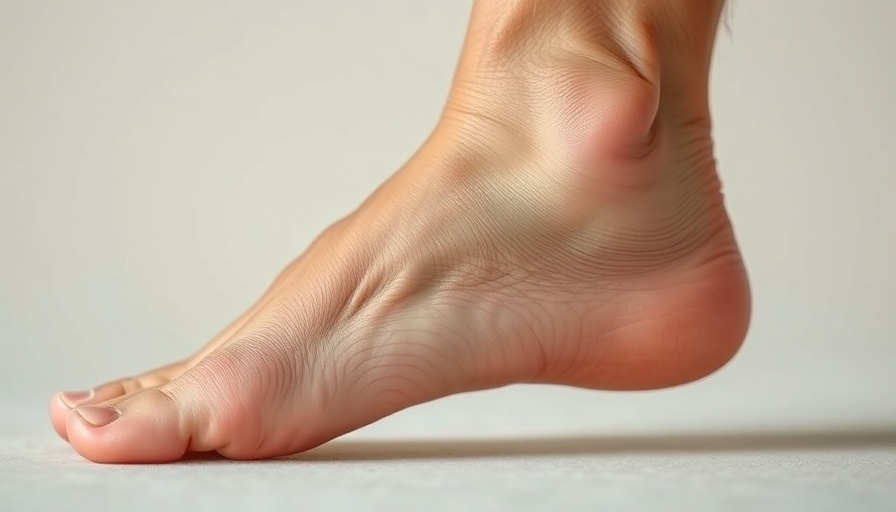
Understanding Morning Stiffness: Why It Happens
Each morning brings a familiar struggle for many seniors: the painful reminder that our bodies can feel sluggish after a long night of sleep. For some, just pouring coffee or buttoning a shirt can feel like an extreme workout. But why does this happen? New insights from research reveal that inflammation levels peak during the night, affecting joint mobility.
In 'Seniors, Don’t Do This Right After Waking Up (It Stiffens Your Joints)', the discussion dives into the surprising reasons behind morning stiffness, prompting a deeper analysis of effective strategies for healthier aging.
Studies, particularly a 2022 report from the Mayo Clinic, suggest that those suffering from rheumatoid arthritis experience up to 300% higher levels of inflammatory cytokines while sleeping. This means, rather than waking up sore from movement, many are experiencing a slow, inflammatory attack their bodies wage while they rest. This can make even the simplest morning routine feel daunting.
The Connection Between Sleep and Joint Health
Think of our joints like a riverbed. Throughout the night, as we remain still, debris settles, blocking the flow of movement. When morning comes, our joints can feel as if they are “clogged” with stiffness. Many wake to feelings of heaviness, as if their bodies are carrying extra weight due to the inflammation that has built up overnight.
Rather than waiting for stiffness to fade, it’s crucial that we begin the morning with gentle movements. The longer one stays still, the more the inflammation settles, making it even harder to move, leading into a frustrating cycle of stiffness and discomfort.
The Role of Movement: Oil for the Joints
Just as gears need oil to function smoothly, our joints rely on synovial fluid to glide without friction. While we sleep, blood flow to our joints decreases and the lubricating synovial fluid can thicken, leading to a feeling of rustiness. When we finally do attempt those first movements, it's often a jarring experience—think of the sound of rusty hinges.
But here's the good news: gentle, early morning movement acts as the lubricant our joints desperately need. A recent report from Harvard Health emphasizes that starting to move earlier can help redistribute this thickened fluid and jumpstart circulation before we even get out of bed.
Daily Rituals for Morning Relief
One effective way to combat morning stiffness is through a simple five-minute bedside ritual. This gentle practice, as shared by various health experts, encourages early movement that is both easy and calming, paving a smoother path for the rest of your day.
1. **Accordion Hands** - While lying down, slowly open and close your hands ten times, as if squeezing a soft ball. This helps to warm the tiny synovial pockets in your fingers. 2. **Wrist Rotations** - Rotate both wrists in slow, wide circles five times in each direction. This motion helps redistribute the thickened synovial fluid. 3. **Heat Touch** - Consider using a warm, microwavable rice sock on joints as you stretch to enhance blood flow and soothe stiffness effectively.
By focusing on gentle movements, individuals can report a significant decrease in morning stiffness, enhancing their confidence and mobility throughout the day. These proactive measures can empower seniors, allowing them to reclaim their morning routines without fear.
Shattering Myths: Movement After Injury
A common misconception many hold is that waiting until the pain diminishes before moving is the safest route. However, laboring through this false notion can inadvertently prolong stiffness. Your joints likely need gentle, guiding movements instead. Each stretch and rotation represents a gentle nudge, helping to activate blood flow and restore mobility.
Martha's experience, for example, highlights how a simple change in approach can transform one’s morning experience from dread to a sense of normalcy. By challenging long-standing habits of waiting, seniors can embrace mornings as a time of awakening rather than struggle.
Emotional Resonance: The Unseen Burden of Loss
The struggle with morning stiffness is not just physical; it can be emotionally heavy. Seniors often feel a sense of loss—missing out on engaging with family or participating in favorite activities due to joint pain. This internal struggle can lead to feelings of frustration and anxiety, creating a reluctance to move. Connection and understanding can be invaluable, and knowing that others feel similarly can foster a sense of support and empowerment.
It's essential to shift how we relate to our stiffness. Instead of viewing it as a defeat, we can recognize it as an invitation to be gentle, to understand our bodies better, and actively seek ways to support them. Acts of kindness towards oneself, like morning rituals, can be transformative.
Conclusion: A Gentle Start to Healthy Aging
As we age, understanding our bodies becomes increasingly important. Embracing a mindful morning routine that incorporates gentle movements not only helps to ease stiffness, but it also instills confidence in our physical wellness. Allowing ourselves a few quiet minutes before rising can lead to profound changes in our daily experience.
Tomorrow morning, before rushing to stand or jump into the day, take a moment to stretch and breathe. Remember, it’s not just about enduring the morning; it’s about welcoming it. Let's shift the conversation around healthy aging towards empowerment and achievable routines. You deserve to feel comfortable and capable every day.
 Add Element
Add Element  Add Row
Add Row 



 Add Row
Add Row  Add
Add 


Write A Comment